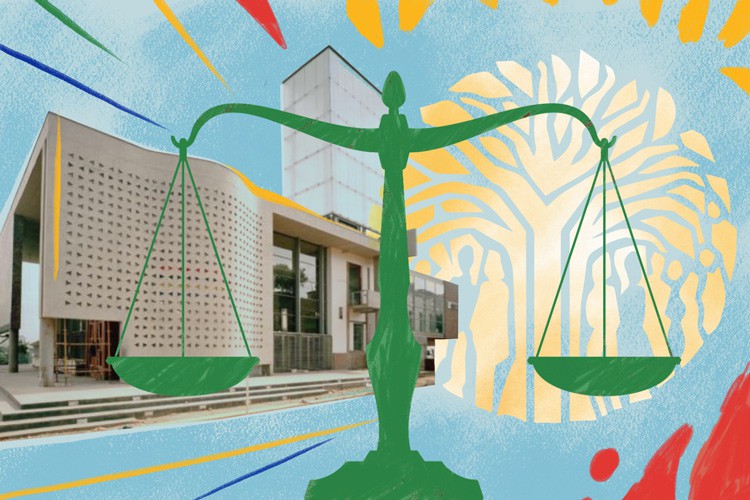
2 July 2021
Illustration: Lisa Nelson
The Supreme Court of Appeal (SCA) has set aside a ruling in June last year by the Gauteng High Court, declaring almost all level 3 and 4 lockdown regulations to be invalid and unconstitutional.
The court labelled the applicants, Reyno Dawid de Beer and his Liberty Fighters Network, “Covid-19 denialists” and rebuked them for crudely and “gratuitously insulting the court”. The SCA ordered that the matter be brought to the attention of the National Director of Public Prosecutions.
In upholding the appeal by the Minister of Co-operative Governance and Traditional Affairs against the order of Judge Norman Davis, the court said he had struck down regulations that had not even been challenged, on a case not properly pleaded, which was “too diffuse and inadequately specified to make out a case for an infringement of the Bill of Rights”.
The five judges — Mahomed Navsa, Nathan Ponnan, Yvonne Mbatha, Owen Rogers and David Unterhalter — described the case as “an object lesson as to how constitutional challenges to promulgated regulations should not be brought”.
In their affidavit, the applicants had referred to “essential facts”, stating that they had been inundated with complaints from its members, mainly tenants and employees of hair and beauty salons and parents of school-going children, in relation to financial hardship they had to ensure.
De Beer then alleged that the Disaster Management Act was not intended to make severe inroads into personal freedoms, and that the regulations were overbroad. But the judges said a proper factual foundation for that conclusion was not provided.
“What followed was a six-page invective, in generalised and dispersed terms against the Government’s Covid-19 response. It defies a concise summary,” the judges said, noting that de Beer was not a qualified virologist, pathologist, immunologist, medical doctor or any kind of scientist.
The underlying theme, the judges said, was one of Covid-19 denialism - that he had a right to rely on his immune system, without Government interference.
Against this, the government submitted that it had taken advice from medical and scientific experts on the ministerial task team and the National Coronavirus Task Team.
It submitted that the declaration of the state of disaster was entirely rational, and in line with what had been done in other countries, such as Italy, Spain and France.
The minister said the limitations on fundamental freedoms were justifiable because the regulations were promulgated to save lives and to use state resources where most needed.
On the merits, the judges said the case brought by de Beer and the Liberty Fighters Network had been based on “sweeping generalisations”. They did not file any confirmatory affidavits from persons who had allegedly complained to them and de Beer had annexed various reports to his affidavit “loosely described as Covid-19 denialism”.
“Regrettably the high court simply failed to consider either the admissibility of the allegations advanced or their evidential weight, if any. Had it done so it would have arrived at the conclusion that even on their own version, no cognizable case had been made out.
“No answer, in truth, was called for by the minister. She was compelled to deal with a case that was framed in almost unintelligible terms.”
The judges also dealt with the fact that De Beer had objected to the appeal being heard “virtually”, as per the general lockdown directives of the Chief Justice, and had called for their recusal.
De Beer, on being informed that the matter was set down to be heard via Microsoft Teams in May, had insisted on an “in-person” hearing, arguing that the “virtual hearing system” was one of the issues under challenge in the appeal.
The appeal judges said he had adopted an “uncompromising position” and had made a “scandalous accusation” that if the court proceeded with a virtual hearing, it would have become a “mere extension of the (minister’s) argument and would no longer be independent”.
In correspondence with the SCA registrar, De Beer said virtual hearings had made a mockery of the judiciary and attached a 100 Monopoly Dollar note “toy money” which he said was symbolic of the fact that “virtual courts, judges and money, do not actually exist”.
The Judges said this was “crass, insulting , disrespectful and inexcusable”.
On the day of the hearing, De Beer joined the virtual hearing, but said he would not participate because he would be “shooting himself in the foot”.
The recusal application was not formally moved and the court heard submissions from the other parties.
In further correspondence with SCA President Mandisa Maya, De Beer accused her of allowing “Covid-19 flimflam to take over the courts judicial functionality and to desecrate the institution to the point of pure codswallop which it is today – nothing but a mere extension of Government’s narrative”.
He said neither she nor any judge were “divine”.
The appeal judges said while courts were not above criticism, it was time to draw a “judicial line in the sand”.
While de Beer was a layperson, his statements were “beyond the pale” , there was no excuse for his conduct and the matter must be brought to the attention of the prosecuting authorities.